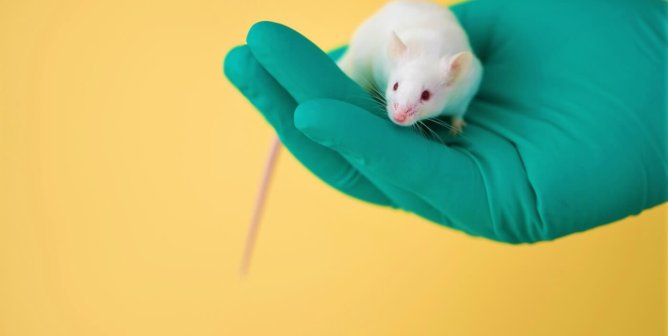Report Card Grades: Natural Resources Defense Council
Report Card Grades » Natural Resources Defense Council » Grade: F
Despite its self-characterization as “The Earth’s Best Defense,” the Natural Resources Defense Council (NRDC) is anything but a friend to animals. In fact, the NRDC has established itself as one of the most outspoken and unrelenting advocates for animal testing in the U.S.
In May 1999, the NRDC coordinated a joint letter with U.S. environmental and children’s health organizations, calling on the Environmental Protection Agency (EPA) to require every pesticide (of which there are thousands) to be tested on animals for “developmental neurotoxicity” (DNT). This massive animal-poisoning test—which kills more than 1,300 animals every time it is performed—involves force-feeding a pesticide chemical to female rats throughout their pregnancy and while they nurse their newborn pups. The pups are then subjected to a series of crude behavioral tests and then are killed so that their brains can be examined. The DNT study has been heavily criticized on both ethical and scientific grounds. Even the EPA’s own Scientific Advisory Panel concluded that “the exposure of rat fetus/pup was not shown to be equivalent to human fetus/infant during equivalent stages of brain development” and that “the current form of the DNT guideline is not a sensitive indicator of toxicity to the offspring.” See PETA’s DNT factsheet for more information about the scientific shortcomings of DNT studies.
The NRDC was also one of the main proponents of a 1996 law that required the EPA to “develop a screening program, using appropriate validated test systems … to determine whether certain substances may have an effect in humans that is similar to an effect produced by a naturally occurring estrogen ….” Then, as a member of the EPA’s Endocrine Disruptor Screening and Testing Advisory Committee, the NRDC supported expanding the “Endocrine Disruptor Screening Program” (EDSP) to examine chemical effects on multiple hormone types (instead of just estrogen) and on multiple species (instead of just humans). This effectively quadrupled the size and scope of the EDSP—as well as the animal body count that this program will generate—and caused the EPA to fall several years behind schedule in implementing the EDSP.
Frustrated by these delays (which it helped to cause), the NRDC sued the EPA in an attempt to force the agency to begin the testing process sooner—without properly validating the test that would be used. PETA intervened in the NRDC’s lawsuit in an attempt to promote the use of promising non-animal test methods that were ignored or overlooked when the EDSP was being designed. Not only did the NRDC fail to support our efforts, it went so far as to attempt to have our lawsuit dismissed, characterizing PETA’s promotion of proper (and legally required) test-method validation as “repeated demands … for additional, time-consuming procedural and substantive roadblocks.”
PETA has made repeated attempts to find common ground with the NRDC and to convince the organization to curb its enthusiastic promotion of animal testing. We wrote to the NRDC in March 2001 asking for its position on animal testing and its endorsement of a statement calling on the EPA to increase its funding and use of non-animal test methods.
We have yet to receive a written response from the NRDC to our March 2001 letter. In a further good-faith attempt to establish some common ground, PETA wrote to the NRDC in August 2002, inviting its endorsement of an entirely non-animal strategy for testing chemicals for endocrine disrupting effects as an alternative to the massive animal testing program under development by the EPA. We did receive a response to that letter. The NRDC declined to support PETA’s non-animal testing strategy while at the same time belittling our ethical concerns regarding the EDSP.
In January 2004, the NRDC provided comments to the U.S. National Toxicology Program (NTP) on a variety of issues. A recurring theme in the NRDC’s comments is the “NTP rodent bioassay” —a $2 million study in which groups of at least 400 rats and 400 mice are dosed with a test chemical for their entire lifespan (2 years on average) to see if they develop cancer. It is striking to note that even though the NRDC says that it supports the “appropriate integration of data from … in vitrotoxicity test methods,” it “strongly objects … if a goal is to develop an alternative approach to the rodent bioassay.” The NRDC goes on to suggest that its support forin vitro methods is tied primarily to their use in “trans-species extrapolations of toxic or carcinogenic effects.” In other words, the NRDC appears to support in vitromethods only as a means of better interpreting the results of animal tests. The NRDC goes on to criticize evidence from human population studies, while explicitly calling for more chemicals to be tested on animals in the NTP bioassay (e.g., “We encourage the NTP to expand this trusted methodology, to handle an increased number of chemicals annually.”).
PETA also asked the NRDC for its support of our “Give the Animals 5” campaign to replace five animal tests with non-animal methods that have been scientifically validated and/or accepted by government regulators in other countries. In its response, the NRDC states: “While we believe that all of these tests have great potential to reduce or replace animal testing, and we fervently hope they will soon be ready to replace animal tests, at this time we understand that they are not fully validated, and are therefore not yet eligible to replace animal testing at this time.” The NRDC goes on to state that the reason for its unwillingness to support a single one of the non-animal test methods that PETA has identified is that the validation of these methods did not occur in the U.S. In other words, the NRDC seems to think that even if a test undergoes successful scientific validation in another country—a process that can take several years and cost millions of dollars—its validity needs to be re-assessed in the U.S. before it can be used in regulatory decisionmaking. Click here to read PETA’s letter to the NRDC on this issue.
On September 20, 2007, the NRDC—along with the Sierra Club and other organizations—petitioned the EPA to require manufacturers to conduct short-term and long-term toxicity experiments on animals for air fresheners. These experiments would have required confining animals to gas chambers, squeezing them into inhalation tubes, or restraining them with breathing apparatuses over their mouths, forcing them to breathe in air fresheners and their ingredients. Fortunately, the EPA agreed with PETA’s formal comments and denied the petition, sparing thousands of animals!
The NRDC inexplicably continues to push for animal testing, even as the rest of the world moves away from these crude, cruel methods and toward modern, more effective non-animal methods. Recently, an NRDC scientist, while acknowledging that “there are non-animal tests that are really valuable, informative, cheaper, and quicker” than animal tests, publicly disagreed with the 2013 European Union ban on cosmetics testing on animals, claiming, “we need to test these products on live things [sic]” instead of using the widely accepted, validated non-animal alternatives to test cosmetics. It would appear that the scientists at the NRDC have never even bothered to read the National Academy of Sciences report Toxicity Testing in the 21st Century and are ignoring the sea change that has occurred in the last quarter-century regarding our understanding of how biological processes work. These advances in our understanding have led to the development of test methods that can look directly at cellular mechanisms rather than at the crude “black box” results that come from using animals. If it were up to the NRDC, however, which does not believe that we can “live in a world without animal testing,” millions of animals would continue to die in chemical testing even as entire nations take concrete steps to ban the use of animals in these tests.
As Dr. Joshua Lederberg, Nobel laureate in medicine, wrote in 1981: “It is simply not possible with all the animals in the world to go through chemicals in the blind way we have at the present time, and reach credible conclusions about the hazards to human health.” Now, more than 30 years later, millions of animals are still dying in agonizing chemical-poisoning tests at the behest of groups like the NRDC, yet we are no closer to getting dangerous chemicals out of our environment.
What You Can Do
Please send polite letters urging the NRDC to turn its back on testing on animals. Click here for points that you can include in your letter.
Send polite comments to:
Rhea Suh, President
Natural Resources Defense Council
40 W. 20th St.
New York, NY 10011
212-727-1773 (fax)
[email protected]



